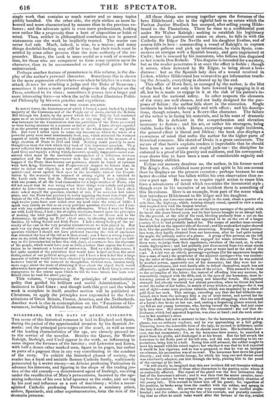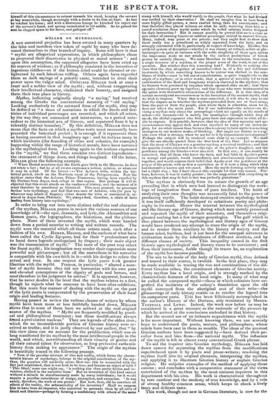HILDEBRAND, OR TI1E DAYS OF QUEEN ELIZABETH. THE scene of
this historical romance is laid in England and Spain, HILDEBRAND, OR TI1E DAYS OF QUEEN ELIZABETH. THE scene of this historical romance is laid in England and Spain, d uring the period of the apprehended invasion by the Spanish Ar- mada; and the principal personages of the court, as well as some of the leading characteristics of the age, are cleverly pressed in- to the service of the novelist. Besides the Queen, Sir Walter Raleigh, Burleigh, and Cecil appear in the work, as influencing in some degree the fortunes of the heroine ; and Leicester and Essex, with half a dozen other marked men, figure in its pages, but rather as parts of a pageant than in any way contributing to the conduct of the story. To exhibit the historical phases of society, the reader has a loyal and amiable Roman Catholic family, maliciously persecuted by a secret enemy—an Atheist professing Puritanism to advance his interests, and figuring in the shape of the trading jus- tice of the old comedy—a disinterested agent of Burleigh, smarting
u nder the recollection of Mary's persecutions, haunted by the ago- nizing reflection of his own brief apostacy at the stake, and serving by his zeal and influence as a sort of machinery ; whilst a mean- spirited Catholic professing Protestantism, a seminary priest, sailors, Spaniards, and other supernumeraries, form the rest of the dramatis personae.
All these things are strung together upon the fortunes of the hero Hildebrand ; who is the rightful heir to an estate which the Puritan Justice Shedlock has usurped, after selling young Hilde- brand to the Plantations. There he rises to a confidential post under Sir Walter Raleigh : seeking to establish his legitimacy and recover his patrimonial estate on shore, he falls in with the Catholic Sir Edgar De Neville and his daughter Evaline, and of course falls in love : commanding a vessel of Raleigh's to capture a Spanish galleon and pick up information, he visits Spain, com- mences an intrigue with a Spanish beauty, and gets imprisoned at Cadiz ; but is rescued by his inamorata, who follows him disguised as her cousin Don Rafaele. This disguise is intended for a mystery, but as the reader penetrates it at once the effect is feeble ; though it serves, when detected by Sir Edgar, to bring about a love- distress : but as the Spanish lady dies of a wound received- in Lisbon, whither Hildebrand has ventured to get information touch- ing the Armada, everything is cleared up by the end.
This affair of Dona Inez, as managed by the author, is the blot of the book ; for not only is his hero lowered by engaging in it at all, but he is made to engage in it at the risk of his patron's in- terest and the national safety. In other respects the elements of the story are well chosen, and not badly designed for the pur- poses of fiction : the author falls short in the execution. Single incidents he indeed tells rapidly and with effect ; and his descrip- tions, though minute, have a Scorr-like character. The failure of the writer is in fusing his materials, and in his want of dramatic power. He is deficient in the comprehension and elevation necessary to fiction ; and his art, or rather his stratagem, being visible, looks like a trick. Hence, excepting some single incidents, the general effect is literal and lifeless : the book also displays a coarseness of mind that unfits the author for the higher parts of historical romance. His sketch of Drake is a gross caricature. The nature of that hero's exploits renders it improbable that he should have been a mere coarse and stupid jack-tar : the discipline he enforced is a proof of his gravity and staidness, and his correspond- ence shows him to have been a man of considerable sagacity and some literary abilities. Unless our memory deceives us, the author, in his former novel The King's Son, exhibited more power and spirit in his sea-scenes than lie displays on the present occasion ; perhaps because he can better describe what has fallen within his own observation than re- vive a past age. He seems to require rapid action to rouse him from a minuteness of detail which resembles the inventorial style ; though even in his narrative of an incident there is something of this literalness. Here is an example, from part of the scene w4icil, first introduces Hildebrand to Sir Edgar and his daughter. " At length, our horseman came to an angle in the road, about a quarter of a mile from the highway, which, turning sharply round, opened to view a scene that inspired him with the deepest interest. "A few yards in his front stood one of the heavy carriages of the period, with its broad side doors forced open, and its four horses brought to an abrupt halt. On the ground, at the side of the road, bleeding profusely from a cut on the forehead, lay a groaning postilion, who appeared to be on the eve of a longer journey than he had probably looked for. The corpse of another man-servant was stretched on the opposite side of the road ; and his unsheathed rapier showed that, like the postilion, he had fallen unresisting. Startling as these particu- lars were, they hardly obtained from our horseman, after he had quite turned the angle, the ordinary notice of a glance. A group of five persons, on the left of the arrested carriage, immediately engaged his whole attention. Two of these were, to judge from their appearance, cavaliers of the road, or, in other words, highwaymen ; and had probably just dismounted from two stout steeds hard by, which were quietly cropping the grass or waste land at the side of the read. A third was an elderly personage—perhaps (for his appearance bespoke him a man of rank) the proprietor of the adjacent carriage—who was combat- ing the taller of these ruffians with his rapier. In this contest he was assisted by another person, apparently one of his domestics; but they were but in- different swordsmen, and were hardly able to defend themselves, much less act offensively, against the experienced arm of the robber. This seemed to be clear to the accomplice of the latter ; for, instead of affording him any succour, he was entirely engaged with the fifth, and, in the eyes of our horseman, most in- teresting person of the party—a young and beautiful female. His superior strength had already rendered her almost powerless, when he thrust his hand under the collar of her bodice, in search of some trinket, or perhaps—for it was out of sight—some more precious valuable, which was suspended by a chain of gold from her neck. This outrage, exceeding any that she had hitherto sus- tained, drew from the unhappy lady a cry of utter terror, and nerved her for one last effort to break from his hold. She was still struggling, when the sound of a horse's feet broke on her ear, and, casting a despairing glance around, her eye fell on our young horseman, who, having turned the angle, had just come fully into view. Her strength was by this time exhausted: she saw that de- liverance, which had appeared hopeless, was close at hand; and she sank sense- less in her assailant's arms. " The ruffian bad not a moment to lose; for the horseman, be perceived at a glance, was no ordinary wayfarer, and he was approaching at a full gallop. Throwing down the insensible form of the lady, he seemed to deliberate, under the first effects of the surprise, how he should meet him. His hesitation, how- ever, was but momentary ; for, as the horseman drew nearer, he snatched a pistol from his girdle, and discharged it at his breast. But the ball struck the horseman in the fleshy part of his left arm, and did not, according to his ex- pectations, bring him to a halt. Seeing him still advance, the robber sought to meet his assault with his raised rapier; but whether it was that he had expected it would be less vigorous, and so was unprepared, or that he was an inexpert swordsman, his precaution was of no avail. The horseman beat down his guard directly ; and with a terrific lounge, for which his long cut-and-thrust sword was excellently adapted, ran him through the body, pinning him to the panel of the carriage at his back. " It will readily be imagined that this new incident did not transpire without attracting the attention of those other charactera in the passing scene whom it so eminently affected. The report of the pistol was the first intimation they had of the horseman's advent ; and it was then that the senior cavalier, turn- ing from the contest he was engaged in, perceived the melancholy situation of the young lady. This seemed to throw him off his guard; for, regardless of his position, he broke away from the conflict with the robber, and sprang to the lady's assistance. His servant was very unequal to the conflict single- handed ; and the robber, seeing the fate of his comrade, and probably conceiv- ing that no effort he could make would alter the fortune of the day, availed
himself of this circumstance to retreat towards his steed, keeping the servant at bay meanwhile, though seemingly with a desire to do him no hurt. At last he reached his horse; and with a dexterous lounge be knocked his rapier out of the servant's hand, and sprang unmolested to his saddle. As be gained his seat he clapped spurs to his horse, and galloped off."



























 Previous page
Previous page